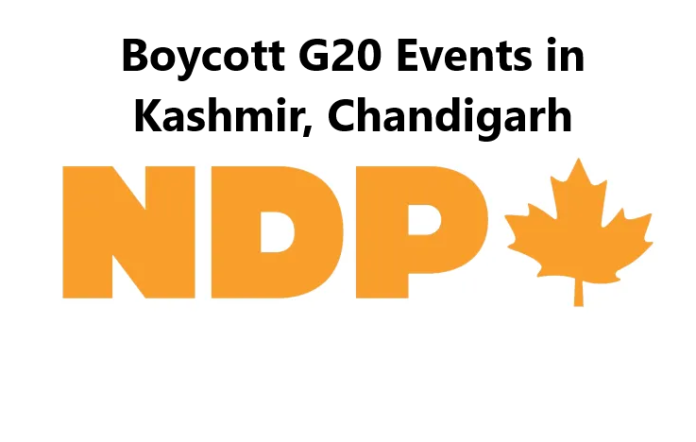
by Zafar Iqbal Yousafzai 5 April 2023
The New Democratic Party (NDP) leader Jagmeet Singh called on Prime Minister Justin Trudeau last week to boycott the G20 summit in Kashmir and Chandigarh, citing human rights issues in the region. The NDP is one of Canada’s major political parties and has been a vocal critic of India’s handling of the situation in Indian-administered Jammu and Kashmir (IIOJK), where India has been accused of widespread human rights violations.
Singh’s demand for a boycott of the G20 summit has been supported by the World Sikh Organization of Canada (WSO), which has also written a letter to Prime Minister Justin Trudeau and Foreign Affairs Minister Melanie Joly in support of the NDP’s call to boycott G20 events in Kashmir and Chandigarh. In the letter, the WSO has also demanded a ban on BJP officials who have made threats against minorities and elected officials from Canada.
The letter highlights the human rights violations of the Indian government, including a rise in the number of attacks on minority communities, particularly Muslims, Sikhs, Christians, and Dalits since 2014. Journalists in India and IIOJK have also faced increasing pressure to self-censor due to threats, legal action, smear campaigns, and physical attacks. Human rights organizations such as Human Rights Watch and Amnesty International have repeatedly drawn attention to the deteriorating human rights situation in India and IIOJK. The WSO argues that India lacks the credibility and moral authority to hold the presidency of the G20 and to host G20 countries, and it would send the wrong message for Canada to attend G20 meetings in India.
India has tried to show normalcy in IIOJK by holding an investment conference from Gulf countries and is now going a step further by trying to host a G20 event. However, the G20 event in IIOJK is seen as a smokescreen aimed at diverting international attention from massive human rights abuses being perpetrated by Indian troops in the territory. Hosting the G20 summit in Kashmir is aimed at misleading the world community about the real situation, and it is expected that in case of any such controversial move from India, designed to seek international legitimacy for an illegal and tyrannical occupation, G20 members will be fully cognizant of the imperatives of law and justice and would reject it outright.
The only way to lasting peace in South Asia is by granting the people of IIOJK their inalienable right to self-determination as pledged in the UNSC resolutions. India’s refusal to hold a plebiscite in IIOJK has been a major point of contention between India and Pakistan for decades. Pakistan has accused India of using excessive force to quell unrest in the region and has repeatedly called for international intervention to resolve the dispute.
The NDP’s call for a boycott of the G20 summit in Kashmir and Chandigarh has drawn mixed reactions from Canadians. Some have criticized the NDP for interfering in India’s internal affairs, while others have praised the party for taking a stand on human rights issues. The Canadian government has yet to respond to the NDP’s call for a boycott, but it is expected to face pressure from both sides of the issue.
The situation in IIOJK remains a matter of concern for the international community, with reports of gross human rights violations, including extrajudicial killings, enforced disappearances, torture, and rape, becoming commonplace. Despite repeated calls from the international community, the Indian government has shown no inclination to address the root causes of the issue and continues to use brute force to maintain its illegal occupation of the region.
The call by the NDP and the WSO to boycott G20 events in Kashmir is a bold step in the right direction. By refusing to attend the event, Canada can send a strong message to India that it cannot continue to flout international law and violate the human rights of the people of IIOJK with impunity. It would also demonstrate Canada’s commitment to upholding human rights and promoting peace and stability in the region.
The international community must act in unison to put pressure on the Indian government to respect the fundamental rights of the people of IIOJK. The continued oppression of the people of the region not only undermines the principles of democracy and human rights but also poses a grave threat to regional peace and stability.
Thus, the call by the NDP and the WSO to boycott G20 events in Kashmir is a welcome step in the right direction. Canada must continue to use its influence to press India to respect the fundamental rights of the people of IIOJK and find a lasting solution to the long-standing issue. The only way to ensure lasting peace in the region is by granting the people of IIOJK their inalienable right to self-determination as pledged in the UNSC resolutions.
